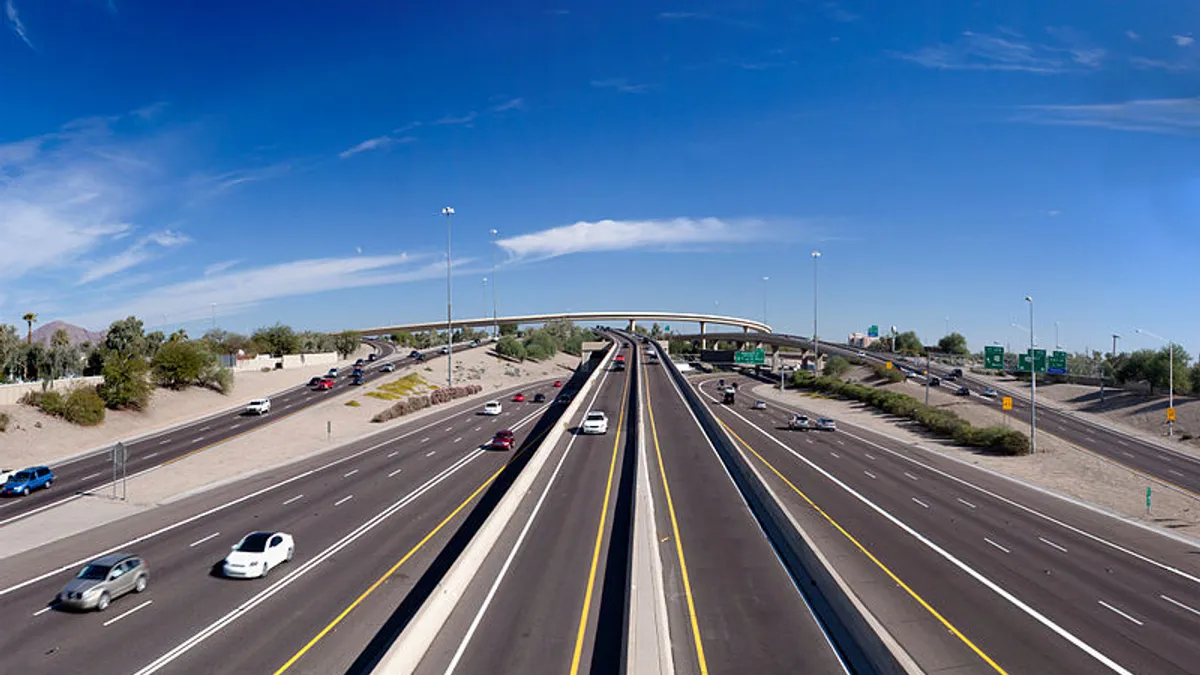Dive Brief:
- The Arizona Department of Transportation has chosen Connect 202 Partners to design, build and maintain a new, $1.9 billion, 22-mile portion of Phoenix freeway Loop 202 as part of a public-private partnership (P3), the Phoenix Business Journal reported. Connect 202, a consortium made up of Fluor Enterprises, Inc., Granite Construction Co., Ames Construction, Inc., and Parsons Brinckerhoff Inc., will also maintain the highway under a 30-year maintenance agreement.
- The ADOT said a 2013 unsolicited bid suggesting a design-build-finance P3 from another team of contractors resulted in the agency’s decision to select a contractor based on that contract structure, according to the Business Journal reported. The ADOT said it plans to finalize its agreement with Connect 202 by mid-February, enabling construction to begin by next summer and expects the project to take up to four years to complete.
- The ADOT stressed cost cutting and a fast completion schedule during the procurement process. The agency, according to the Arizona Capitol Times, would normally split a project this large into several smaller ones, but it believes the state will save money by allowing one team to handle the highway addition as a single project.
Dive Insight:
"While ADOT has successfully built and managed hundreds of miles of freeways in the Phoenix metropolitan area, following a public-private partnership path for the first time was an appropriate tool for the South Mountain Freeway," ADOT Director John Halikowski told the Business Journal.
P3s are an increasingly popular choice for large, public projects, especially those requiring significant maintenance. This partnership between a public entity and a private company, or group of companies, is often seen by public agencies as a way to shift the project risk to the private sector while also hurdling the typical funding and bureaucracy obstacles endemic to public projects.
Canada has seen recent successes with P3s. Toronto was able to shave off $2 billion from a light rail project using that structure, and Edmonton is getting underway with a $1.8 billion P3 rail project of its own.
Texas also used a P3 for the Dallas LBJ Express highway rehab, and officials said they owe the project’s early opening to that arrangement. In addition, Arlington, TX, officials voted last month to enter into a P3 agreement with the Texas Rangers for a $200 million mixed-use development next to the ballpark. P3s probably got their biggest boost in the U.S. this year from Brendan Bechtel, president of the Bechtel Group, in a USA Today opinion piece. In addressing the nation’s deteriorating infrastructure, Bechtel suggested using P3s as a way to repair bridges, roads and highways in a speedy, cost-effective manner.
However, not everyone is a fan of P3s. Contractors in West Virginia are suing West Virginia University, claiming that the school is using public-private partnerships to get around bidding requirements for publicly funded projects. Their claims arose after WVU reportedly awarded Turner Construction a P3 contract for a $70 million mixed-use development without a bidding process.













